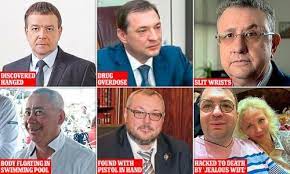Yuri Voronov’s corpse was
found floating in his country house swimming pool early last month. Drowning
accidents occur every summer, all over the world. But Mr Voronov, a
multi-millionaire Russian tycoon, met his watery end in a manner that was both
highly unusual and, no doubt, alarming to some of his peers.
Mr Voronov, 61, did not drown.
The normally crystal waters were clouded with blood, thanks to the close-range
gunshot wound that killed him.
Then there is the case of
Anatoly Chubais. A former deputy prime minister, he oversaw Russia’s transformation
from a communist to a capitalist economy.
He was taken suddenly and
seriously ill this week. Until recently President Putin’s special envoy on
sustainable energy and climate change, Mr Chubais, 67, was the highest
Kremlin official to resign his post and leave the country in protest at
the invasion of Ukraine.
It is being reported that the
economist is on life support, suffering from a rare neurological disorder.
Other sources and opposition activists have speculated that he is the victim of attempted murder by poisoning, made to look like natural causes. An unnamed
European intelligence agency is investigating.
Such suspicion is
understandable. The Chubais case is only the latest in a series of mysterious
illnesses and violent deaths — more than a dozen — to have befallen Russian
businessmen, officials and their close families, since Putin’s ‘special
military operation’ in Ukraine began and Western sanctions were imposed.
The deaths appear to have been
caused either by suicide or domestic dispute, albeit amid wild tales of
shamans, toad venom, illicit affairs and hearts drawn in blood.
Yet there is another link.
Like the unfortunate Voronov and Chubais, a number of these dead men held
high-ranking positions at — or had close working ties with — the
Kremlin-controlled energy giant Gazprom. This £68 billion leviathan — Russia’s
biggest company — is centre stage in the Kremlin’s economic and military
confrontation with the West over Ukraine.
As a number of European
countries are major users of Russian gas — around a third of Germany’s gas is
supplied by Moscow — energy supplies can be weaponized by the Kremlin. And if
Putin wants to turn off the tap, Gazprom is the vehicle for this policy.
So what does this have to do
with the sudden death of so many multi-millionaires who have prospered in the Putin
years? Couldn’t their grisly ends have been prompted by the stress of the
strict sanctions imposed by the West on their businesses and personal assets?
Or perhaps, more prosaically, by the kind of catastrophic marital disputes that
plague the super-rich?
Of course, it is just possible
that the litany of deaths is a horrible coincidence. But in Russia, such
‘coincidences’ have a sinister history. Some believe the Kremlin is behind the
‘suicides’. Had the victims fallen out of favour, for whatever reason, or did
they know too much about Gazprom’s labyrinthine financial secrets, endemic
corruption and links to the security services?
In a time of war, a dictator
does not pussyfoot. And Putin, the former KGB operative, has indeed torn up the
rule book.
He has invaded a sovereign
state. His artillery regiments are launching missiles into residential
neighbourhoods. His foot soldiers are raping and executing civilians. And he is
holding world food supplies hostage by his blockade of Black Sea grain exports.
Against this backdrop,
removing a few troublesome tycoons with a knife, gun or poison must seem no
bother at all.
The killing — or culling —
began in January as Russian forces massed on the Ukrainian border.
Leonid Shulman, the
60-year-old boss of Gazprom Invest’s transport service, was found dead in a
pool of blood on the floor of a bathroom in his house in a wealthy gated
development in the district of Leninsky near St Petersburg, where many top
Gazprom officials have their country homes.







